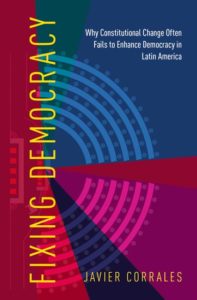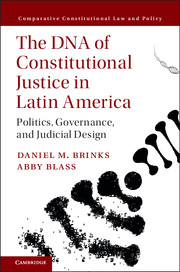 The resilience of democracy in Latin America is impressive, notes Javier Corrales, a professor of political science at Amherst College, and author of “Fixing Democracy: Why Constitutional Change Often Fails to Enhance Democracy in Latin America.”
The resilience of democracy in Latin America is impressive, notes Javier Corrales, a professor of political science at Amherst College, and author of “Fixing Democracy: Why Constitutional Change Often Fails to Enhance Democracy in Latin America.”
Democracy spread to every country except Cuba and has survived in every one except Venezuela and Nicaragua (and possibly Honduras and Bolivia) because Latin American societies have learned to bolster the line of defense against democracy’s internal enemies, adds Corrales, a contributor to the NED’s Journal of Democracy. They’ve done it through institutional innovation, he writes for The New York Times:
- First, Latin Americans have focused on institutions that regulate entry and exit mechanisms. At the entry level, the most important innovation has been the runoff rule. Runoff rules have now been adopted by 75 percent of Latin American countries. Cynthia McClintock’s research shows the moderating effects of runoff rules. …..
- Another key lesson from Latin America is the importance of enhancing the autonomy of courts and social movements — important checks on illiberal presidents. Courts have the legal power to
 stop illiberal measures, and social movements can block them via resistance. … A new book documents how Latin American countries for the most part have made the process of selecting judges more pluralistic, which makes it less dependent on the president. Likewise, where social movements have resisted the temptation to be co-opted by presidents, illiberal presidents face barriers. …
stop illiberal measures, and social movements can block them via resistance. … A new book documents how Latin American countries for the most part have made the process of selecting judges more pluralistic, which makes it less dependent on the president. Likewise, where social movements have resisted the temptation to be co-opted by presidents, illiberal presidents face barriers. … - A third lesson from Latin America is information maximization. Almost every Latin American country has expanded the number of watchdogs, or as they are often called, observatories. The obsession with observation started with electoral observation in the 1980s, but now covers a variety of public concerns: homicides, police activity, government-business relations, social policy, gender and sexuality. …
- Finally, some Latin American countries have taken to heart the very liberal principle that in a democracy, the winner shouldn’t win that much, and the loser shouldn’t lose that much. The most obvious example involves gender. Women are one of the world’s most underrepresented groups in politics. But in Latin America, they have expanded their presence in legislatures, mostly after adopting quota systems mandating parties to nominate more women….RTWT
Latin America’s Populist Revival
The center appears to be collapsing across Latin America, notes the Chicago Council on Global Affairs. In Colombia, Ivan Duque’s tough stance on the FARC peace deal and the economy swept him into office in June. Andres Manuel Lopez Obrador’s left-wing populism delivered a historic electoral victory in Mexico this past July. And Jair Bolsonaro’s outspoken, far-right platform has made him a frontrunner for Brazil’s presidential election in October. Twenty years after Hugo Chavez took power with a populist agenda, Venezuela is in turmoil.
Will this new wave deliver on their promises to tackle the region’s corruption and inequalities? And how will these elections affect relations with the Unites States? These questions are addressed by (below): Roberta S. Jacobson, Former Ambassador of the United States to Mexico Peter Schechter, Founder, Altamar Joel Velasco, Principal, Albright Stonebridge Group. Moderated by Juliana Kerr.







